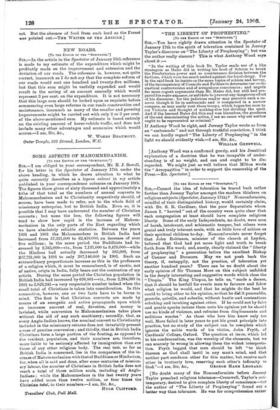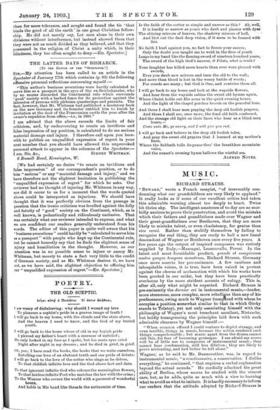[To THE EDITOR OP THE "SPECTATOR. " ] SIR,—Cannot the idea of
toleration be traced back rather farther than Jeremy Taylor amongst the modern thinkers on religious subjects (Spectator, January 17th) ? Nonconformists, mindful of their distinguished history, would certainly claim, with Dr. S. R. Gardiner, that the poor Separatists whom James I. " harried " out of the country were quite clear that each congregation at least should have complete religious liberty. Some of the early Independents, no doubt, were men of harsh, intolerant, and schismatic temper, but others were genial and truly tolerant souls, with as little love of schism as their spiritual children to-day. Nonconformists never forget that John Robinson, minister of the church at Leyden, believed that God had yet more light and truth to break forth from His word; and, surely, clearly claimed the " liberty of prophesying " a generation before the excellent Bishop of Connor and Dromore. May we not push back the theory, if, unhappily, not the practice, of toleration yet another hundred years ? There can be no doubt about the early opinion of Sir Thomas More on this subject unfolded in the deeply interesting and suggestive words which close the " Utopia." The King Utopus, he tells us, " made a decree, that it should be lawfull for everie man to favours and folow what religion he would, and that he mighte do the best he could to bring other to his opinion, so that he did it peaceablie, gentelie, quietlie, and soberlie, without hastie and contentious rebuking and invehing against other. If he could not by faire and gentle speche induce them unto his opinion- yet he should use no kinde of violence, and refraine from displeasaunte and seditious wordes." As those who love him know only too well, More failed in later years to put his great principle into practice, but no study of the subject can be complete which ignores the noble words of his victim, John Fryth, of Cardinals' College, Oxford. The question at issue, which led to his condemnation, was the worship of the elements, but we can scarcely be wrong in allowing them the widest interpreta- tion. Fryth begged that men should be left "to think thereon as God shall instil in any man's mind, and that neither part condemn other for this matter, but receive each other in brotherly love, reserving each other's infirmity to
God."—I am, Sir, &c.,
GEORGE HARE LEONARD.
[No doubt many of the Nonconformists before Jeremy Taylor preached religious tolerance—Cromwell, Taylor's con- temporary, desired to give complete liberty of conscience—but the author of "The Liberty of Prophesying" found out a better way than tolerance. lie was for comprehension rather
than for mere tolerance, and sought and found the tie 'that binds the good of all the earth' in one great Christian fellow- ship. He did not merely say, Let men alone in their own divisions without interference, but instead showed them that they were not as much divided as they believed, and that they possessed in the religion of Christ a unity which, in their blindness, they too often sought to deny.—En. Spectator.]







































 Previous page
Previous page